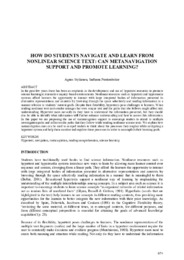| dc.contributor.author | Stylianou, Agnes | en |
| dc.contributor.author | Puntambekar, Sadhana | en |
| dc.coverage.spatial | CY - Λευκωσία | en |
| dc.creator | Stylianou, Agnes | en |
| dc.creator | Puntambekar, Sadhana | en |
| dc.date.accessioned | 2016-02-18T10:48:34Z | |
| dc.date.available | 2016-02-18T10:48:34Z | |
| dc.date.issued | 2003 | |
| dc.identifier.uri | http://hdl.handle.net/10797/14727 | en |
| dc.description | Περιέχει το πλήρες κείμενο | el |
| dc.description.abstract | In the past few years there has been an emphasis in the development and use of hypertext resources to promote science learning in interactive inquiry-based environments. Nonlinear resources such as hypertext and hypermedia systems afford learners the opportunity to interact with large integrated bodies of information presented in alternative representations and contexts by browsing through the space selectively and reading information in a manner relevant to students’ current goals. Despite their flexibility, hypertexts pose challenges to learners. When reading nonlinear text each reader arranges her own unique text and the paths that she follows might affect text understanding. Hypertext users not only do they have to understand the information presented, but they should also be able to identify what information will further enhance understanding and how to access this information. In this paper we are proposing the use of metanavigation support to encourage readers to attend to multiple
investigation paths and reflect on the paths that they follow while reading nonlinear science texts. We explain how metanavigation cues can be used to compel readers to think about the processes they employ while navigating a hypertext system and help them monitor and regulate these processes in order to accomplish their learning goals. | en |
| dc.language.iso | eng | en |
| dc.publisher | Department of Educational Sciences, University of Cyprus | en |
| dc.relation.ispartof | Computer based learning | en |
| dc.rights | info:eu-repo/semantics/openAccess | en |
| dc.rights | Open Access | en |
| dc.source | CBLIS Conference Proceedings 2003 Volume I: New Technologies and their applications in education | en |
| dc.title | How do students navigate and learn from nonlinear science text: can metanavigation support and promote learning? | en |
| dc.type | info:eu-repo/semantics/conferenceObject | en |
| dc.subject.uncontrolledterm | Hypertext | en |
| dc.subject.uncontrolledterm | Navigation | en |
| dc.subject.uncontrolledterm | Metacognition | en |
| dc.subject.uncontrolledterm | Reading comprehension | en |
| dc.subject.uncontrolledterm | Science learning | en |
| dc.contributor.conferenceorganizer | Learning in Physics Group, University of Cyprus | en |
| dc.contributor.coordinator | Constantinou, Constantinos P. | en |
